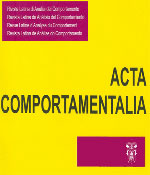Una alternativa de intervención breve y temprana para bebedores problema en México
Contenido principal del artículo
Resumen
En este trabajo se presentan los resultados de la aplicación de una intervención breve de corte cognoscitivo conductual aplicado en la Ciudad de México, a una muestra de 177 individuos con problemas de abuso en el consumo de alcohol. El programa terapéutico se caracteriza por ser una intervención motivacional que emplea procedimientos de autocontrol, análisis funcional de la conducta de beber, y la identificación de situaciones individuales de riesgo, para promover un cambio en la conducta de consumo excesivo del individuo. Los resultados encontrados muestran que el consumo excesivo de alcohol de los sujetos expuestos al tratamiento se modificó hacia un patrón de consumo moderado, el cual se observa que se mantuvo en el seguimiento realizado a los 6 y 12 meses de haber terminado el tratamiento. Este cambio se vio acompañado de una reducción de problemas asociados al consumo de alcohol y un incremento en la confianza situacional para controlar episodios de consumo excesivo. Se discuten las implicaciones de estos resultados en el desarrollo de políticas de salud pública que propicien esquemas de intervención breve y temprana con esta población, y que estas acciones se vean sujetas a un proceso de evaluación empírica que constate su efectividad y costo-beneficio.
Detalles del artículo
Citas en Dimensions Service

<a rel="license" href="http://creativecommons.org/licenses/by-nc-sa/4.0/"><img alt="Licencia de Creative Commons" style="border-width:0" src="https://i.creativecommons.org/l/by-nc-sa/4.0/88x31.png" /></a><br />Este obra está bajo una <a rel="license" href="http://creativecommons.org/licenses/by-nc-sa/4.0/">licencia de Creative Commons Reconocimiento-NoComercial-CompartirIgual 4.0 Internacional</a>.


